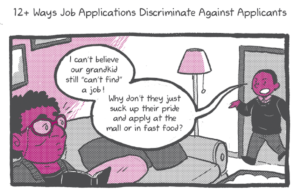Hello. This is another video in a series I am doing with Everyday Feminism, which you probably know by now is a website dedicated to helping you stand up to and break down everyday oppression.
In this video, I wanted to talk about something a little bit more personal for me which is my struggle what is called imposter syndrome. Imposter syndrome is the psychological phenomenon in which people are unable to internalize their own accomplishments.
It is the feeling that I am a fraud, that my success is a result of luck rather than ability and that at some point, everyone else is going to realize this and I will be outed as the fraud that I am. It’s the fear that I am lacking the skills and intelligence that I am perceived to have, whether in school or online.
Ultimately, I have to realize that I’m not simply perceived to be smart or good at philosophy or thing like that. I am actually doing the work and getting the grades and meeting the standards.
Even knowing that, I still feel like a fake. Why is that? What is that that’s happening? I think it has to do with growing up in a family that placed a lot of emphasis on achievement. Grades were very important in my family which obviously has benefited me and has made me work very hard at school.
I have gotten far in school because of it but it also is due to a society where there are these social pressures to go through life in a certain way, in a certain order which I have mostly adhered to. I mean I have continued in school and things like that.
I am on my way to a career and all these things that I am supposed to do but what happens when you follow all of these things, and when you grow up in a way that there is so much pressure on achieving and success is self-worth can actually tangled up in your achievements.
Self-worth can become contingent on achieving which is a problem because self worth should be completely separate. It should be something that I have regardless of achievements. Ultimately, whether I succeed or fail, now or in the future, I’m stuck with myself and I have to accept myself for who I am. I can’t lose all my self worth when I have a failure.
Even with each achievement, it becomes hard to believe that I am worthy of it or that I really earned it. Even with outward signs of success, like good grades or a good job, I still struggle to attribute my accomplishment to me and my hard work rather than luck or chance.
Imposter syndrome is something I struggle with and it affects me. It affects what I put myself out there for. It’s made me less likely to put myself out there for things like new jobs or submitting papers for conferences or wanting to speak in front of other people for feedback.
It’s also made me incredibly nervous to have conversations with other people who I perceive to know more about things, even my peers in philosophy. I get nervous to speak about philosophy with them sometimes they are like my good friend because I feel like I will be exposed for not knowing enough.
It’s even more heightened with professors or people perceived to know much, much more than me. I’m afraid to say something that will expose me as the fraud that I am even though I have been doing philosophy for many years now and I know a great deal.
In certain areas, I am going to know more than a lot of other people and in other areas, they are going to know a lot more than me. There’s nothing wrong about that.
There’s nothing bad about it. It doesn’t really reflect on me at all. It’s just life and I need to be able to accept what I know and be comfortable with that and not feel like I am faking it because what it has resulted in is, it’s made academia a place of stress for me.
That is something that I deal with constantly being a student forever. Part of the reason I think that I struggle with this is because especially in academic philosophy, there is something called “stereotype” threat which I think affects me and a lot of other people.
Stereotype threat is the risk of confirming a negative stereotype about your group. Basically, if there is negative stereotypes present, it can make the members of the stereotyped group nervous and hinder their ability to perform.
They’ve done studies on this and there was a math test which asks for the student’s gender at the start of the test and then a different version of the same math test where it asks the gender at the end of the test. It resulted in much poorer results for women on the test where they answered their gender at the start than when they answered it at the end but for men, there was no difference.
Because women are stereotypically thought to be bad at math, simply being reminded of they’re being a woman just before taking a math test, was enough to greatly affect their outcome. They have done many studies on this sort of thing. You can look it up and see how these stereotypes can actually really affect you, especially if you are reminded of them. But sometimes you don’t explicit reminding. You are just affected by it negatively. So that’s stereotype threat.
And if someone in a male dominated discipline, philosophy, which is the most male dominate discipline in the humanities (and a very white dominated field of academia), I am up against a specific stereotype of a classic philosopher, you know, an old white man stroking his beard by the fire with a quill or something.
Now, I am white, which grants me a great deal of privilege and comfort in philosophy, but still the emblematic image of philosophy is quite clearly not me. It’s also not what philosophy is today and it’s not what it should be, certainly, but it exists as a stereotype and sort of an archetype. As a result, many women and people of color, especially, struggle to see themselves as “proper” philosophers. I do.
So how do I deal with these issues of stereotype threat and imposter syndrome? I am working on it. I haven’t figured it out completely. I think making myself aware of these feelings has helped me realize at least some of the time that they are misguided.
It helps to be reminded when I get a good grade, my partner often reminds me like, “This is because of you. This is because you put in hours of work and you should be really proud of yourself” and you know reminds me of that all the time, reminds me that I really did earn my achievements and have to remind myself that a lot. It also helps to talk about it with other people, especially people who are also struggling with it in their own context.
Which is why I wanted to make this video to start a conversation with ya’ll. Whether you are in academia, or in any other field or context that makes you feel like you are a fraud or where you are constantly at odds with stereotypes, which say that you should not be there, you should not be doing what you are doing. Well, you should be there. Your outsider status makes you more valuable.
That is what I tell myself when I am the only girl in a philosophy class. When feminism is being taught as a footnote rather than an important philosophical approach. I remind myself that what I know is valuable and just because maybe no one else in the room is thinking it, it doesn’t make it less valuable.
I’m not perfect and I am definitely still learning but I have learned a lot already and I am struggling every day to internalize that and if you have any tips, let’s talk about it in the comments. I will see y’all in my next video, or, you’ll see me.



















